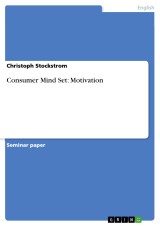Details

Consumer Mind Set: Motivation
1. Auflage
|
13,99 € |
|
| Verlag: | Grin Verlag |
| Format: | EPUB, PDF |
| Veröffentl.: | 29.07.2005 |
| ISBN/EAN: | 9783638403993 |
| Sprache: | englisch |
| Anzahl Seiten: | 17 |
Dieses eBook erhalten Sie ohne Kopierschutz.
Beschreibungen
Seminar paper from the year 2003 in the subject American Studies - Culture and Applied Geography, grade: 1,0, University of Hamburg, language: English, abstract: Introduction
We know nothing about motivation. All we can do is write books about it.
PETER F. DRUCKER
Motivation is a hypothetical construct serving to explain the stimuli of human behavior1, i.e. it describes what “makes people tick”. Hence, understanding motivation is of vital importance whenever one interacts with other people. In the field of business it is especially relevant in organization science and marketing. While organization science emphasizes the motivation of employees, marketing focuses on the motivation of consumers in order to enable a company to design products which meet consumers’ needs and wants. In this context “[t]he investigation of motivation is central to understanding the acquisition, consumption, and disposition of goods, services, and ideas.”2
Taking into account the fundamental role of motivation as a key driver of human behavior, PROFESSOR DRUCKER’S claim would indicate that marketing managers would largely have to rely on luck when designing and marketing their products. However, the situation concerning targeted marketing activities does not seem to be so bleak, if one considers that some companies consistently outperform others. Merely attributing this to a luckier marketing department therefore seems inappropriate. Hence, it is the aim of this paper to probe PROFESSOR DRUCKER’S opinion and shed some light on the different aspects of motivation in consumer research. This requires taking into account the theoretical background of motivation, as well as an analysis of the problems practitioners face when measuring this hypothetical construct. Moreover, one has to investigate how they use these results to derive appropriate marketing strategies. For this purpose, the paper is organized as follows: The second section – without claiming to be exhaustive – provides an overview of the theory necessary to appreciate the importance of motivation. The third section turns to the practical implications considering the collection of information on motivation and the exploitation of this data for marketing purposes. The paper finishes with a summary of the obtained results.
We know nothing about motivation. All we can do is write books about it.
PETER F. DRUCKER
Motivation is a hypothetical construct serving to explain the stimuli of human behavior1, i.e. it describes what “makes people tick”. Hence, understanding motivation is of vital importance whenever one interacts with other people. In the field of business it is especially relevant in organization science and marketing. While organization science emphasizes the motivation of employees, marketing focuses on the motivation of consumers in order to enable a company to design products which meet consumers’ needs and wants. In this context “[t]he investigation of motivation is central to understanding the acquisition, consumption, and disposition of goods, services, and ideas.”2
Taking into account the fundamental role of motivation as a key driver of human behavior, PROFESSOR DRUCKER’S claim would indicate that marketing managers would largely have to rely on luck when designing and marketing their products. However, the situation concerning targeted marketing activities does not seem to be so bleak, if one considers that some companies consistently outperform others. Merely attributing this to a luckier marketing department therefore seems inappropriate. Hence, it is the aim of this paper to probe PROFESSOR DRUCKER’S opinion and shed some light on the different aspects of motivation in consumer research. This requires taking into account the theoretical background of motivation, as well as an analysis of the problems practitioners face when measuring this hypothetical construct. Moreover, one has to investigate how they use these results to derive appropriate marketing strategies. For this purpose, the paper is organized as follows: The second section – without claiming to be exhaustive – provides an overview of the theory necessary to appreciate the importance of motivation. The third section turns to the practical implications considering the collection of information on motivation and the exploitation of this data for marketing purposes. The paper finishes with a summary of the obtained results.
Diese Produkte könnten Sie auch interessieren:

Politeness in Shakespeare: Applying Brown and Levinson´s politeness theory to Shakespeare's comedies

von: Abdelaziz Bouchara

43,00 €















